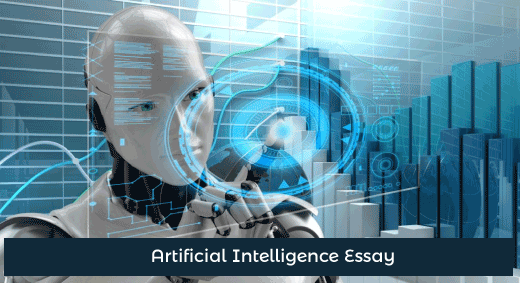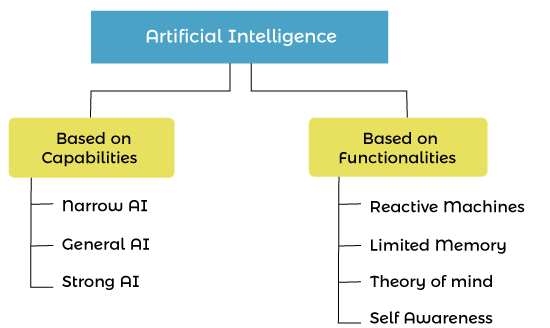Examples of AI-Artificial IntelligenceIn this topic, we are going to provide an essay on Artificial Intelligence. This long essay on Artificial Intelligence will cover more than 1000 words, including Introduction of AI, History of AI, Advantages and disadvantages, Types of AI, Applications of AI, Challenges with AI, and Conclusion. This long essay will be helpful for students and competitive exam aspirants.  Essay on Artificial Intelligence
Artificial Intelligence is a combination of two words Artificial and Intelligence, which refers to man-made intelligence. Therefore, when machines are equipped with man-made intelligence to perform intelligent tasks similar to humans, it is known as Artificial Intelligence. It is all about developing intelligent machines that can simulate the human brain and work & behave like human beings. We can define AI as, "Artificial Intelligence is a branch of computer science that deals with developing intelligent machines which can behave like human, think like human, and has ability to take decisions by their own." With AI, machines can have human-based skills such as learning, reasoning, and solving logical problems. AI is one of the fastest-growing technology that is making human life much easier by providing solutions for complex problems. It has also brought different opportunities for everyone, and hence it is a very demanding technology in the market.
Artificial intelligence is assumed a new technology, but in reality, it is not new. The researchers in the field of AI are much older. It is said that the concept of intelligent machines was found in Greek Mythology. Below are some keystones in the development of AI:
Advantages:
Disadvantages:

1. Narrow AI or Weak AI: Narrow AI or Weak AI is a basic kind of Artificial Intelligence, which is capable of completing dedicated tasks with intelligence. The current version of AI is narrow AI. Narrow AI can only perform the specific task and not beyond its limitation, as they are trained for one task only. It is programmed to do a specific task such as Play Chess, Checking Weather, etc. 2. General AI: Artificial General intelligence or "Strong" AI defines the machines that can show human intelligence. We can say, Machines with AGI can successfully perform any intellectual task that a human can do. This is the sort of AI that we see in movies like "Her" or other sci-fi movies in which humans interact with machines and operating systems that are conscious, sentient, and driven by emotion and self-awareness. Currently, this type of intelligence does not exist in the real world and only exist in researches and movies. However, researchers across the world are working to develop such machines, which is still a very difficult task. 3. Super AI Super AI refers to AI that is self-aware, with cognitive abilities that surpass that of humans. It is a level where machines are capable of doing any task that a human can do with cognitive properties. However, Super AI is still a hypothetical concept, and it is a challenging task to develop such AI-enabled machines.
1. Reactive Machines Reactive machines are the basic types of AI, which don't store memories or past experiences for their actions. These types of AI machines only focus on current scenarios and work as per the requirement with the best possible actions. IBM's Deep Blue is an example of a reactive machine. 2. Limited Memory Limited memory can store some memory or past experiences for a limited time period. Some examples of limited memory are Self-driving cars. 3. Theory of Mind Theory of Mind is the type of AI which are capable of understanding human emotions, and interact with the human in their way. However, such AI machines are yet not developed, and developers and researchers are making efforts for creating such AI-enabled machines. 4. Self-awareness Self-awareness AI is the future of Artificial Intelligence, which will have its own awareness, sentiments, and consciousness. This AI is only a hypothetical concept and will take a long journey and challenges to create such AI.
1. Game Playing: AI is widely used in Gaming. Different strategic games such as Chess, where the machine needs to think logically, and video games to provide real-time experiences use Artificial Intelligence. 2. Robotics: Artificial Intelligence is commonly used in the field of Robotics to develop intelligent robots. AI implemented robots use real-time updates to sense any obstacle in their path and can change the path instantly. AI robots can be used for carrying goods in hospitals and industries and can also be used for other different purposes. 3. Healthcare: In the healthcare sector, AI has diverse uses. In this field, AI can be used to detect diseases and cancer cells. It also helps in finding new drugs with the use of historical data and medical intelligence. 4. Computer Vision: Computer vision enables the computer system to understand and derive meaningful information from digital images, video, and other visual input with the help of AI. 5. Agriculture: AI is now widely used in Agriculture; for example, with the help of AI, we can easily identify defects and nutrient absences in the soil. To identify these defects, AI robots can be utilized. AI bots can also be used in crop harvesting at a higher speed than human workers. 6. E-commerce AI is one of the widely used and demanding technologies in the E-commerce industry. With AI, e-commerce businesses are gaining more profit and grow in business by recommending products as per the user requirement. 7. Social Media Different social media websites such as Facebook, Instagram, Twitter, etc., use AI to make the user experiences much better by providing different features. For example, Twitter uses AI to recommend tweets as per the user interest and search history.
As a beginner, below are some of the prerequisites that will help to get started with AI technology.
One of the big challenges with AI is that we don't have enough data to work with AI systems, or data we have is of poor quality or unstructured. AI depends on data for its working and requires a huge amount of data for a good result, but in the real world, data is available either in raw form or unstructured form that contains lots of impurities and missing values that cannot be processed or analyzed. Hence the processing of such data is a big task for organizations, and it takes lots of effort and is a time-consuming process.
There is still a lack of IT infrastructures, mainly in start-ups, which is a big issue in AI researches and development.
AI is growing continuously day by day with rapid speed, and more people are accepting the proven ideas of AI. The growing rate of AI also needs developers of AI tech. However, the professionals with full scales skills to develop high-level AI implementations are still lacking, which is also one of the big challenges with AI.
Computing power has always been a big issue in the IT industry, but day by day, this issue has been resolved. However, with the development of AI, this issue has arisen again. Deep learning and the processing of neural networks, which are part of AI, require a high level of computing power, and are a major challenge for the tech industries. Mainly for start-ups, collecting money and such high computing power to process the data is a big deal.
One of the latest challenges with AI is that now organizations need to be wary of AI. The legal issues are raised for concern that if AI collects sensitive data, that may be a violation of federal laws. Although it is not illegal, industries need to be careful of any supposed impact that might negatively affect their organization.
Artificial Intelligence is undoubtedly a trending and emerging technology. It is growing very fast day by day, and it is enabling machines to mimic the human brain. Due to its high performance and as it is making human life easier, it is becoming a highly demanded technology among industries. However, there are also some challenges and problems with AI. Many people around the world are still thinking of it as a risky technology, because they feel that if it overtakes humans, it will be dangerous for humanity, as shown in various sci-fi movies. However, the day-to-day development of AI is making it a comfortable technology, and people are connecting with it more. Therefore, we can conclude that it is a great technology, but each technique must be used in a limited way in order to be used effectively, without any harm. Next TopicArtificial Intelligence in Healthcare |